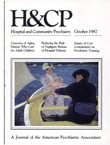Aging Parents as Caregivers of Mentally Ill Adult Children: An Emerging Social Problem
Abstract
More than one-third of long-term mentally ill adults live with their families, most with aging parents, a situation that accentuates the need for residential alternatives to home care for deinstitutionalized patients who will out-live their caregivers. The role of parenting mentally disabled adults may also impose undue stress on elderly persons. Objective and subjective parental burden, including fears for the patient's future, are increased by the mental health system's failure to offer education, support, training in problem solving, and a collaborative role in discharge planning to family members. Social policy implications of considering families as primary caregivers include the danger that government will be relieved of responsibility for care of the mentally ill, the creation of a potentially at-risk population among aging parents and other family members affected by the stresses of caregiving, and the reduction of the patient's potential for independent living.
Access content
To read the fulltext, please use one of the options below to sign in or purchase access.- Personal login
- Institutional Login
- Sign in via OpenAthens
- Register for access
-
Please login/register if you wish to pair your device and check access availability.
Not a subscriber?
PsychiatryOnline subscription options offer access to the DSM-5 library, books, journals, CME, and patient resources. This all-in-one virtual library provides psychiatrists and mental health professionals with key resources for diagnosis, treatment, research, and professional development.
Need more help? PsychiatryOnline Customer Service may be reached by emailing [email protected] or by calling 800-368-5777 (in the U.S.) or 703-907-7322 (outside the U.S.).



